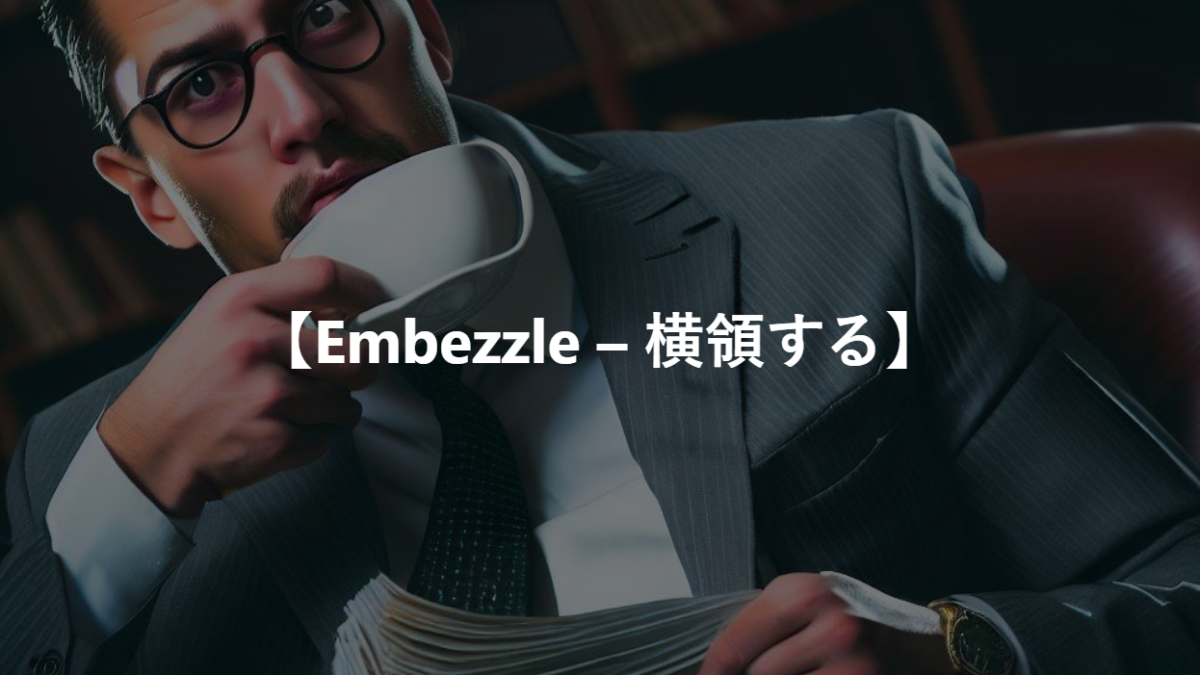語源・類義語・反対語・例文
【Embezzle – 横領する】という単語の語源とか由来を知っていますか?
単語「embezzle」は、中期フランス語の「embesiller」または「embesillir」に由来し、これは破壊する、または無くすという意味があります。これは、接頭辞「em-」(中に、または内部を意味する)と「besillier」(苦しめる、または浪費する)が組み合わさったものと考えられていますが、その正確な起源はやや不明確であり、歴史的な解釈の対象となっています。
この用語は15世紀に英語の使用に入り、当初は消散させる、破壊する、または浪費するという意味を持っていました。時間が経つにつれて、その使用法はより特化され、特に職務や公式の立場で信頼された資金や財産を不正に流用する行為を指すようになりました。これが「to embezzle」(横領する)の意味です。
したがって、「embezzle」の現代の使用法は、特に法的な意味合いを持ちます:通常は職務や公式の立場で信頼されていた個人が、不正に個人財産を取ることを指します。この意味の進化は、破壊や浪費の一般的な意味から、資金や資源の悪用に関連するより正確な法的定義への変化を反映しています。
The word “embezzle” originates from the Middle French word “embesiller” or “embesillir,” which means to destroy or make away with. This itself is thought to come from the prefix “em-” (meaning in or into) combined with “besillier” (to torment or waste), although the exact origins are somewhat unclear and subject to historical interpretation.
The term came into English usage in the 15th century and initially could mean to dissipate, destroy, or waste. Over time, its usage became more specialized, and it came to refer specifically to the act of wrongfully appropriating funds or property that one has been trusted with, especially in a work or official capacity, hence “to embezzle.”
So, the modern usage of “embezzle” carries a very specific legal connotation: the fraudulent taking of personal property by someone to whom it was entrusted, typically in their job or official capacity. This evolution in meaning reflects a shift from a general sense of destruction or waste to a more precise legalistic definition related to the misuse of funds or resources.
この単語の類義語・反対語を教えてください。
【類義語】
- Misappropriate: 不正に流用する、横領する(例:The accountant misappropriated company funds. / 会計士が企業の資金を不正に流用した。)
- Steal: 盗む、くすねる(例:Someone stole my wallet while I was shopping. / 誰かが私が買い物している間に財布を盗んだ。)
- Defraud: 欺く、詐欺を行う(例:The company was accused of defrauding its customers. / その企業は顧客をだましていたと非難された。)
【反対語】
- Return: 返却する、返還する(例:I need to return this book to the library. / この本を図書館に返却しなければならない。)
- Donate: 寄付する、贈る(例:We donated a portion of our profits to charity. / 私たちは利益の一部を慈善団体に寄付した。)
似た単語で間違いやすい単語はありますか?
- Misappropriate: 不正使用する。この単語は、特に金銭や資源が本来の目的以外のために不正に使用される場合に使われます。「Embezzle」と同様に金銭の不正利用を指しますが、より幅広い不正使用を含むことがあります。
- Defraud: 詐欺する。これは、欺くことによって他人から金銭を不正に取得する行為を指します。「Embezzle」が信頼された立場からの横領を指すのに対し、「Defraud」は詐欺的な手段による金銭の不正取得を広く指します。
- Steal: 盗む。一般的な窃盗行為を指し、横領や詐欺とは異なり、公然とは信頼されていない人が秘密裏に物を取る行為です。「Embezzle」と比べると、法的な信頼関係の下での行為というよりは、一般的な盗みを指します。
- Launder: 資金洗浄する。不正な手段で得た金銭を合法的な資金の流れに紛れ込ませる行為を指します。「Embezzle」が金銭の不正取得に焦点を当てるのに対し、「Launder」はその後の不正資金の隠蔽や合法化に関わります。
この単語にまつわるエピソードなどはありますか?
「Embezzle」にまつわる有名なエピソードとしては、アメリカの大統領リチャード・ニクソンが、1972年に起きたウォーターゲート事件で政治資金を不正流用したことが挙げられます。この事件は、民主党全国委員会本部に侵入し、盗聴器を仕掛けたことが発覚して起きた政治スキャンダルで、ニクソン政権の崩壊につながりました。
ニクソンはウォーターゲート事件の責任を取る形で辞任し、後に連邦捜査局(FBI)によって発覚した政治資金の不正流用に関しては、「大統領特権」を主張して告発を回避しました。この事件は、アメリカ政治史上において重大なスキャンダルとして語り継がれています。
A famous episode related to “embezzle” involves American President Richard Nixon, who was implicated in the misappropriation of political funds during the 1972 Watergate scandal. This scandal began with the break-in and bugging of the Democratic National Committee headquarters, leading to the collapse of the Nixon administration.
Nixon resigned from office as a form of taking responsibility for the Watergate scandal, and later, regarding the misappropriation of political funds uncovered by the Federal Bureau of Investigation (FBI), he claimed “executive privilege” to avoid indictment. This incident remains one of the most significant scandals in American political history.
この単語を使った例文をいくつか教えてください
The company’s accountant was caught embezzling money from the company’s accounts.
(その会社の会計士は、会社の口座からお金を横領しているところを捕まった。)
The politician was accused of embezzling funds from the government’s budget.
(その政治家は、政府予算から資金を横領したとして告発された。)
The employee was fired for embezzlement after it was discovered that she had been stealing from the cash register.
(その従業員は、レジから盗みをしていたことが発覚し、横領のために解雇された。)
The businessman was charged with embezzlement after it was discovered that he had been siphoning off company funds for his own personal use.
(そのビジネスマンは、自分の個人的な用途に会社の資金を流用していたことが発覚し、横領罪で起訴された。)
【Embezzle – 横領する】のコロケーション
- Embezzle funds: 資金を横領する。企業や組織から金銭を不正に取り出し、個人の利益のために使用する行為を指します。最も一般的な横領の形態の一つです。
- Embezzle money: 金銭を横領する。これは「embezzle funds」とほぼ同義で、金銭を不正に使用することを指しますが、こちらはより一般的な用語です。
- Embezzle from [an organization]: [組織]から横領する。特定の組織や会社から不正に資金を盗み取る行為を指します。この表現は、横領が発生した具体的な場所や対象を示す際に使用されます。
- Embezzle assets: 資産を横領する。金銭だけでなく、企業や組織の資産(株式、物品など)を不正に取り扱う行為を指します。横領される対象が金銭以外の場合に用いられることがあります。
- Embezzle for personal gain: 個人の利益のために横領する。この表現は、横領行為が行われる動機を強調します。つまり、不正行為が個人の財政的な利益を増やす目的で行われることを明示しています。
財務取引や責任の複雑な網の中で、「横領する」という行為は、重大な信頼違反として現れます。この不正行為が取りうるさまざまなニュアンスについて掘り下げてみましょう。
「Embezzle funds」は、企業や組織から金銭を不正に取り出し、個人の利益のために使用する行為を指します。これは横領の最も一般的な形態の一つであり、特定の目的のために委ねられた資金の誤用に内在する裏切りを浮き彫りにします。
「Embezzle money」は、「Embezzle funds」とほぼ同義で、金銭を不正に使用することを示しますが、この用語はより広範で、企業や組織の文脈だけでなく、資金が誤って使われる可能性のあるあらゆるシナリオを包含します。
「Embezzle from [an organization]」は、特定の組織や会社から不正に資金を盗み取る行為を示します。このフレーズは、横領された資金の出所を特定し、不正行為が特定の組織的または企業的な設定内で発生したことを示します。
「Embezzle assets」は、横領の範囲を現金取引だけでなく、企業や組織の資産(株式、物品など)を不正に取り扱う行為にまで拡大します。この用語は、横領の対象が金銭以外の有形または無形の財産に及ぶ場合に使用されます。
「Embezzle for personal gain」は、横領行為が行われる動機を強調します。これは、不正行為が個人の財政的な利益を増やす目的で行われることを明示しています。このフレーズは、横領が単なる信頼違反でなく、個人の豊かさを増すための意図的な行為として特徴づけられることを強調しています。
これらの各表現は、横領のさまざまな側面、行為のメカニズムから背後にある動機までを明らかにし、この詐欺行為の包括的な描写を提供します。
In the intricate web of financial transactions and responsibilities, the act of “embezzling” emerges as a significant breach of trust. Let’s delve into the various nuances this misconduct can take.
“Embezzle funds” refers to the act of illicitly extracting money from a business or organization for personal benefit. It represents one of the most common forms of embezzlement, highlighting the betrayal inherent in the misappropriation of funds entrusted for a particular purpose.
“Embezzle money” is nearly synonymous with “embezzle funds,” denoting the unauthorized use of money. However, this term is broader, encompassing any wrongful use of money, not just within corporate or organizational contexts but potentially in any scenario where funds are misdirected.
“Embezzle from [an organization]” specifies the act of stealing funds directly from a particular entity. This phrase pinpoints the source of the embezzled funds, indicating that the illicit activity has occurred within a specific organizational or corporate setting.
“Embezzle assets” expands the scope of embezzlement beyond mere cash transactions to include the improper handling of a company’s or organization’s assets, such as stocks, goods, and other valuables. This term is used when the subject of the embezzlement extends to tangible or intangible property other than money.
“Embezzle for personal gain” emphasizes the motive behind the embezzlement. It specifies that the wrongful act is committed with the intention of increasing one’s own financial standing. This phrase underlines the selfish intent that typically drives the act of embezzlement, distinguishing it as not just a breach of trust, but a deliberate action for personal enrichment.
Each of these expressions sheds light on the various dimensions of embezzlement, from the mechanics of the act to the motivations behind it, painting a comprehensive picture of this fraudulent behavior.
練習問題
文法問題
問題1
Choose the correct word to complete the sentence.
“The accountant was arrested for attempting to __ company funds.”
(A) empower
(B) emulate
(C) embezzle
(D) embody
解答1
(C) embezzle
解説1
この文では「会計士が会社の資金を横領しようとしたとして逮捕された」という意味です。”embezzle” は「横領する」という意味で、文脈に最も適しています。他の選択肢は文脈に合いません。
問題2
Fill in the blank with the correct word.
“She was caught trying to __ money from her employer’s account.”
(A) embezzle
(B) embrace
(C) emerge
(D) embroider
解答2
(A) embezzle
解説2
この文では「彼女は雇用主の口座からお金を横領しようとして捕まった」という意味です。”embezzle” は「横領する」という意味で、文脈に最も適しています。他の選択肢は文脈に合いません。
問題3
Select the best option to complete the sentence.
“The investigation revealed that the manager had been __ funds for years.”
(A) embodying
(B) embezzling
(C) emigrating
(D) enhancing
解答3
(B) embezzling
解説3
この文では「調査により、マネージャーが何年もの間資金を横領していたことが明らかになった」という意味です。”embezzling” は「横領する」という意味で、文脈に最も適しています。他の選択肢は文脈に合いません。
問題4
Complete the sentence with the appropriate word.
“The CEO was accused of __ millions of dollars from the company.”
(A) embezzling
(B) emitting
(C) embodying
(D) empowering
解答4
(A) embezzling
解説4
この文では「CEOは会社から数百万ドルを横領したとして告発された」という意味です。”embezzling” は「横領する」という意味で、文脈に最も適しています。他の選択肢は文脈に合いません。
問題5
Choose the correct option to complete the sentence.
“The cashier was found guilty of __ small amounts of cash over several years.”
(A) embezzling
(B) emerging
(C) embracing
(D) embarrassing
解答5
(A) embezzling
解説5
この文では「そのレジ係は数年間にわたって少額の現金を横領していたことが有罪とされた」という意味です。”embezzling” は「横領する」という意味で、文脈に最も適しています。他の選択肢は文脈に合いません。

